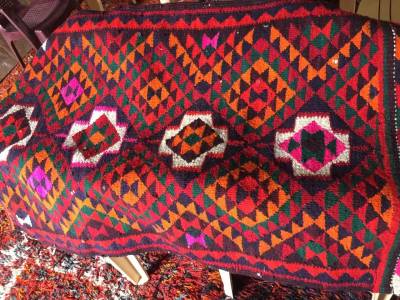
The team, led by Dr Neelam Raina, conducted a detailed survey of textile crafts practices in Samawah and Erbil, aimed at building a clear picture of the textile craft sector in these regions, including, but not limited to, market dynamics in post-conflict Iraq.
As part of the project, the team also worked on establishing a new relationship between two NGOs in different parts of Iraq, since they share a vision of reinstating crafts practices within communities and valuing the culture and traditions of making. The NGOs encountered different challenges and developed specific strategies to cope with them. By working together and sharing resources they were able to develop a small network of producers and crafts.
The project was also focused on mapping the craft heritage of Iraq, particularly textile related crafts. Mapping was aimed at obtaining a clearer view of the current practices and the actors engaged in the sector of textile crafts in post-conflict Iraq. The team identified areas in need of urgent attention and the support necessary for its revival.
The research revealed that the number of people working in textile crafts has dramatically decreased. This happened as a result of ongoing conflicts and commercialization of cheap and low-quality weaving products from Iran, Turkey and China. One of the consequences was the decrease in traditional textile productions and related skills. The traditional weaving production and related handicrafts, such as spinning, dyeing and the construction of looms, was one of the main sources of income in Iraqi households. Unfortunately, all this slowed dramatically in the 90s. Despite this, a small centre of production and craft culture remained in Samawah, Erbil and some of the other cities and towns in Iraq.
Interviews and surveys conducted of the craft producer groups revealed that Iraq’s craft heritage can promote social cohesion and propose employment and can serve as a vital component of economic development, in post-conflict areas, particularly for women affected by conflict and displacement. This research has identified specific needs and capacities of the crafts sector, that needs investment to keep practices intact, and to promote the capacity of creative practices to serve as a bridge for reconstructing communities and societies. Iraqi and Kurdish Iraqi craft people, craft-related civil sector organisations, museums, educational institutions should look upon their governments for the promotion and protection of craft heritage.
 Close
Close

